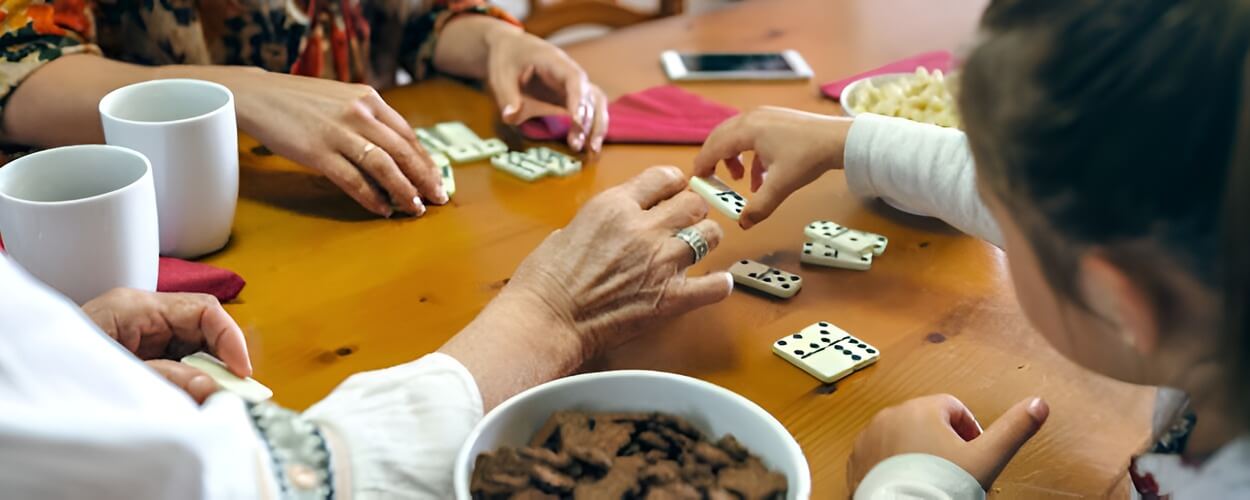
Living with the condition of dementia can be overwhelming, not only for the individuals but also for the caregivers and family members. Doing daily chores becomes difficult. Engaging seniors in meaningful activities stimulates the brain and brings happiness. Games for dementia patients are not just for fun, but they are also a great way to improve mood and boost memory. In this blog, we will discuss brain-boosting games for individuals with dementia. These activities are designed to be simple, fun, and engaging, helping seniors stay active both mentally and emotionally, and build a strong connection.
Through games, dementia patients can have numerous benefits, extending beyond entertainment. Here’s why they matter:
Cognitive Stimulation
Games stimulate the brain through thinking and slow down mental decline by challenging the brain in different ways. This helps boost the brain.
Emotional Connection
Playing games with friends, family, and caregivers brings laughter and builds a strong connection. This engagement minimizes the feeling of isolation.
Stress Relief
Fun games for dementia patients minimize stress and restlessness. Games bring a feeling of happiness and achievement.
Improved Motor Skills
Multiple games involve physical movement that may include rolling dice or handling cards. This improves the hand-eye coordination.
Boosted Self-Esteem
Completing a game successfully helps the patient feel valued and brings a sense of accomplishment.
While choosing a game for an individual with dementia, it is important to consider:
Stage of dementia – Patients at the early stage of dementia can like complex game activities, whereas patients with later stages prefer simple games.
Simplicity – Game rules should be simple. As complex things can annoy them and make them feel frustrated.
Familiarity – Games that feel familiar, like bingo or matching, can be more comforting and less intimidating.
Engagement – The game should involve interaction with other individuals to keep patients interested in the game.
Flexibility – Adjust the difficulty level of games according to the patient’s ability.
When it comes to keeping dementia patients engaged, easy games are a great option. Here are some simple games for dementia patients that are easy to understand and play:
Bingo
Bingo is one of the most popular games for individuals with dementia. It enhances the brain’s ability, improves focus, and enhances recognition. Caregivers can use larger cards with clear visuals to make it easier for the patient.
Matching Cards
The matching card is one of the easier games where players flip over cards and try to find pairs of matching cards. To make it more enjoyable, use bright colored cards with familiar visuals.
Sorting Games
Sorting the objects, like buttons or cards, can improve motor skills. Patients can sort the colored objects by shape, size, or color. This makes them feel stress-free.
Dominoes
Matching tiles or watching the patterns grow is a very satisfying activity. Dominoes with large dots or colors are easy to play and encourage social interaction.
Ball Toss
A ball toss game promotes physical movement. Patients can make a circle and pass the ball while sitting. This game also builds a strong connection.

To slow down the cognitive impairment, memory games are necessary. Here are a few memory games for dementia patients that are gentle yet effective:
Name That Tune
Playing the tune of a familiar song and asking patients to name the song is an interesting activity. Music deeply connects people and brings back positive emotions.
Photo Recall
Showing patients an old family picture and asking questions like “Who is this?” or “Where was this taken?” This game recalls memories and initiates conversation.
Object Tray Game
Put a few items, such as toys or keys, on a tray for the patient to see. After a minute of looking at the tray, cover the tray, and ask the patient what objects they remember.
Word Association
The word association game stimulates language and boosts memory. Say a word like “apple” and ask the patient to respond with something related, such as “fruit”.
Story Building
Start with a simple story and ask the patients to continue adding a few words to the story. This memory game for dementia patients is interactive and improves creativity.
Fun games bring enjoyment and laughter. This also reduces stress and adds more happiness to life. Here are some ideas for fun games for dementia patients:
Sing-Along Karaoke
Many individuals with dementia still remember the lyrics of their favorite songs. Singing favorite songs can uplift the mood. Karaoke is a fun way to engage socially.
Puzzles
Jigsaw puzzles with large and bright pictures are fun. They provide a sense of achievement once it is completed.
Balloon Volleyball
Playing volleyball with a balloon instead of a ball makes this game safe and engaging. This fun activity encourages physical movement and brings laughter.
Dice Games
Large dice with numbers or pictures can be used for various fun activities, such as counting or making up stories. They are simple yet playful games.
Sensory Games
Use of textured objects, scented items, or soft toys for sensory games. This game is both fun and comforting. Patients enjoy guessing what they are smelling or touching.
To make a positive and stress-free experience of playing games for dementia patients, keep these tips in mind:
Focus On Enjoyment – Always keep the activity fun, not a competition.
Use Large Visuals – Keep the cards or pictures clear, big, and colorful.
Give Plenty Of Time – Do not rush to finish the game. Patience makes patients feel comfortable.
Encourage Gently – Even though mistakes are made, always praise and encourage them.
Adapt When Needed – If the game feels complex to the patient, simplify it or switch to another game.
Games are a fun way to bring happiness, promote connection, and stimulate memory for people living with dementia. Simple games for dementia patients provide comfort and encourage social connection. At Star Capital, we believe that meaningful moments are crucial for senior citizens’ overall well-being. By adding games into daily life, caregivers can help dementia patients live with happiness and mental stimulation.
42220 Sweet Court
Chantilly, VA 20152
Phone : 571-406-7827
GOOSE CREEK MANOR
104 Marylin Street
Goose Creek, SC 29445
Phone : 843-572-7442
SHULER HEALTH CARE
250 pitts street, kernersville,
NC, 27284
Phone : 336-996-0772
CYPRESS MANOR
503 W Buncombe Street,
Roper, NC, 27970
Phone : 252-791-0002
ELTON RCH
30 W Main Street,
Waterbury, CT, 06702
Phone : 203-756-1229
Waterbury Garden RCH
128 Cedar Ave,
Waterbury, CT
Phone : 475-306-6888